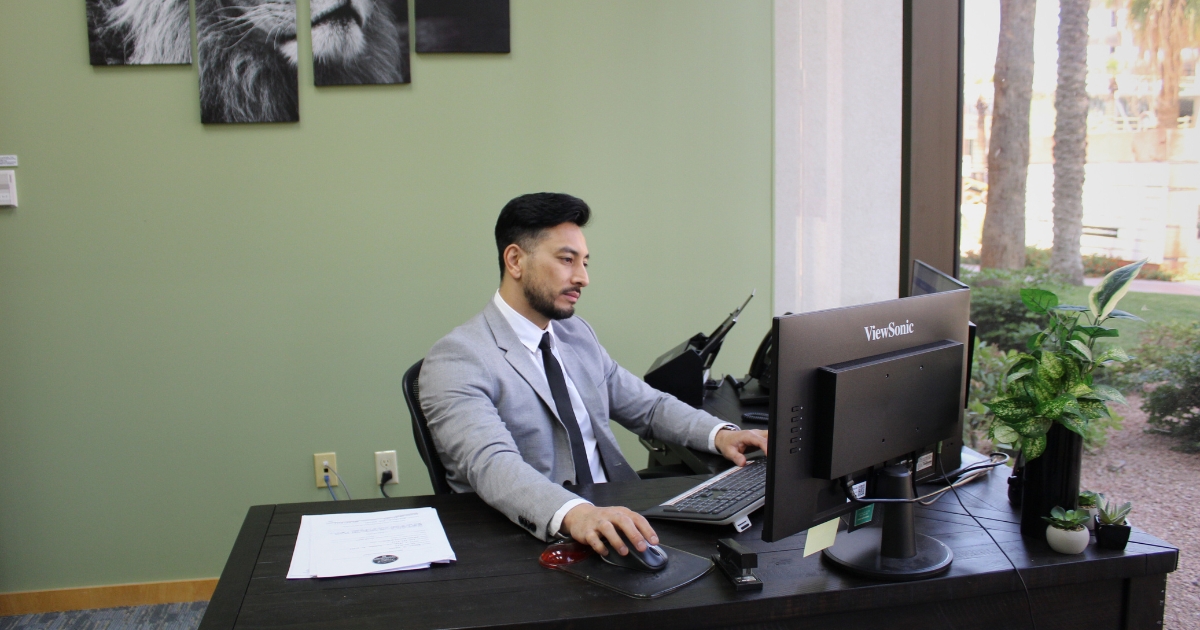Table of Contents
ToggleCo-parenting is not always easy. From spending time away from your child to maintaining constructive communication with a former partner, there are a multitude of challenges to confront. While nothing can make a co-parenting situation perfect, there are some co-parenting and joint custody tips you can follow to ensure your joint custody process is as smooth and simple as possible.
What Is Co-Parenting?
When the parents of a child are divorced or were never married but share parenting time and legal decision-making rights (also known as physical and legal custody) of their child, they can be referred to as co-parents. Every co-parenting arrangement can look a bit different, but often, the child or children spend a portion of their time living with and being taken care of by one parent and the remaining portion of their time being taken care of by the other parent. Typically, each parent covers the costs of living for the time the child is at their residence, though this is certainly not the only way to handle co-parenting.
The Arizona Family Court system prefers, when possible, to help children maintain relationships and spend time with both parents. This arrangement can create a healthier environment for your children – especially compared to the environment created when living in a household with two unhappy or arguing adults. However, it can also create some challenges.
The Challenges of Co-Parenting After Divorce
If you and your former partner share custody of your child, you might encounter some of the following challenges.
Creating a Parenting Schedule

When you first begin co-parenting, it can be difficult to come up with a consistent schedule to present to the judge for approval – and even more difficult to find one that meets your needs. Creating a schedule that ensures your child can attend the school and activities they’re accustomed to can pose one potential issue. Working around two job schedules can also present scheduling problems.
Challenging Behaviors
You might also find that your children exhibit challenging behaviors as they attempt to adjust to the transition in their lives. They might be disobeying or disrespecting you, and you might find it hard to set up a new routine for them to follow. Alternatively, they may push back against the schedule or visit a particular parent.
Uncooperative Parents
You could also see a lack of cooperation from your co-parent, which can complicate your situation. Refusal to compromise can lengthen negotiation or mediation, delaying the divorce or custody process. If your co-parent is uncooperative after a custody order is in place, it can be enforced by the court.
Maintaining Your Relationship With Your Child
Maintaining a close relationship with your child is hard enough as they continue to grow up. If your child then begins to spend half of their time with their other parent, you might feel as if you are growing apart. If your child is upset with the new parenting situation, they might also begin to become closed off and introverted.
Tips For Divorced Parents
There is no quick fix to making co-parenting work, but you can follow some of the tips below to make things a bit easier.
Establish and Follow Detailed Routines

Everyone needs to take some time to adjust to a new way of life. One of the most effective ways to get adjusted to the new co-parenting schedule is to outline regular routines. For instance, you could make a school or activity pick-up schedule and share it with your child and co-parent so that everyone knows who will be where and when. You and your co-parent could also establish the same nighttime routine for your child so they experience consistency no matter whose house they are in.
Maintain Consistent Rules and Rewards
In addition to routines, you and your co-parent could strive to establish similar rules for your child. For example, you could attempt to ensure that you have the same rules about technology use. If you do not, you might find that your child begins to feel frustrated with one parent for not having the same rules as the other parent.
The same consistency is important when it comes to rewards. For instance, if one parent is giving an allowance to their child but not telling the other parent, this could cause conflict between all involved. If you are planning to give your child an allowance or make a significant purchase or gift for your child, it is important that you tell your co-parent so everyone is kept in the loop.
Avoid buying your child’s affection with gifts or rewards. To ensure your co-parenting experience is fair, respectful, and conflict-free, communicate with your co-parent if they engage in this behavior, as well. Instead, take the time to have meaningful conversations and spend quality time together.
Maintain, Consistent, Respectful Communication
Co-parenting with a former partner can be difficult, especially when you struggle to communicate. However, in order to make sure co-parenting is equitable and effective, you need to, at the very least, maintain respectful, consistent communication about your child. You may want to invest in a co-parent communication app so that your conversations remain on record, which can inspire you both to stay polite and on-topic.
It is vital to make sure that you stay in contact about any changes to your or your child’s schedule. For example, if you are unable to pick up your child from school on the day that you usually do so, you should inform your co-parent about this and respectfully coordinate a time to make up that time with your child. On the other hand, if your co-parent reaches out to you about changes in their or your child’s schedule, you should strive to respond politely and be flexible and understanding.
Set Boundaries
One of the hallmarks of respectful co-parenting is not crossing personal boundaries. You can and should communicate about your child’s needs and any information related to parenting your children. However, if you are not comfortable sharing personal information with your co-parent, such as information about your new partner, your work, and more, you do not have to. You should communicate any boundaries to your co-parent so they know not to overstep or try to find out such information from your child.
Reach Out For Support When Necessary
If you are having a difficult time staying in contact with your co-parent or if you frequently find yourselves having conflicts, you should consider seeking professional support. Reaching out to a therapist or another professional, such as a mediator who can help you reach important decisions, can make communication much easier and less stressful. You should also consider reaching out to a family law attorney for guidance on how to make major, legally binding changes to your child custody or visitation arrangements.
Spend Quality Time With Your Child

When your child starts spending a significant amount of time away from you, it is natural to want to remain close and stay up-to-date regarding their life. It is important that you do not pressure your children, especially if they are tweens or teens, to share everything that they do with their other parent if they do not wish to do so. When you maintain communication with your co-parent, you can learn about what they do together, but you’ll want to ensure your child knows they are in a safe space with you. They shouldn’t feel like they have to report anything about their other parent if they do not want to do so.
Instead of interrogating your child about their life in their other home, you should strive to make the most of the time you do have with your child. Try your best to be present and attentive when you spend time with them, and foster conversation with them about their interests, feelings, and challenges. You could also plan activities with them to make your time together special. Even small, inexpensive activities like playing a board game before bed can help you soak up the moments you spend together.
Co-Parenting Dos and Don’ts
There is a significant amount of information to take in about sharing custody with your child’s other parent. Below is a list of handy dos and don’ts to keep in mind when co-parenting gets tough.
Do:
- Respect the schedule arranged in your child custody agreement.
- Acknowledge your child’s feelings about the arrangement and make them feel heard.
- Communicate openly and honestly with your co-parent about your child’s needs.
- Establish a schedule with clear routines for your child.
- Be flexible and respectful if your co-parent reaches out about concerns or new needs.
- Be patient as your child adjusts to their new routines, and be prepared for new behaviors
- Strive to politely communicate questions or concerns with your co-parent if necessary.
Don’t:
- Press your child for information about their other parent.
- Shame your child for their feelings about the arrangement, no matter what they are.
- Tell your child negative or false information about their other parent.
- Make your child communicate information to their other parent.
- Bribe or pressure your child into spending more time with you than the other parent.
- Conceal information from your child’s other parent about your child’s needs.
Co-Parenting and Joint Custody FAQs
It is common to have a long list of questions about your joint child custody arrangement. Below are the answers to some frequently asked questions about child custody.

Perhaps they have a conflict in their life, such as a new health problem, that is making them unable to co-parent. If this is not the case or if communicating is difficult, you should reach out to a professional who could be of assistance, such as a therapist or a family law attorney.
You should strive to reach out to them and work on resolving your issues through polite, respectful communication. If this is not possible, you might consider reaching out to a professional, such as a therapist or a mediator, who can assist you with your communication.
If enforcement is necessary, law enforcement officers can inform the other parent that refusal to follow the order will result in charges, arrests, and fines. Alternatively, you can file a Motion to Enforce Parenting Time, which can result in contempt of court and even a cash bond.
Consult a Family Law Attorney About Joint Custody

If you need advice about child custody issues, a family law attorney can help, whether you’re going through a divorce or seeking a modification. Family lawyers are legal professionals who focus on representing clients in domestic disputes, such as divorce and child custody determinations. Since the court’s main priority is the best interest of your children during custody proceedings, consulting with a family law attorney about your child’s needs can help you ensure that your proposed arrangement is suitable for your family.
If you need a child custody attorney in Phoenix, Gilbert, Scottsdale, or Peoria, The Valley Law Group has decades of experience with the Arizona Family Court system and locations in both cities. Our team of award-winning attorneys takes the time to get to know you and your child’s needs so you can rest assured that you have a dedicated advocate in your corner.
Contact us today to learn more about how we can support you and to schedule a consultation.
*Editor’s Note: This article was originally published on May 9, 2021, and was updated on February 22, 2024.

Jonathan Roeder, Founder/Director of Marketing of The Valley Law Group, is an Arizona native who has dedicated his life and career to the service of others. After graduating salutatorian of his high school class, Jonathan attended beautiful and prestigious Pepperdine University, where he majored in Political Science. During his tenure at Pepperdine University, his passion for helping others grew after securing a clinical position with a residential treatment center for juveniles with substance addictions. Post-graduation, Jonathan returned to Arizona and served as a residential manager for mentally and physically disabled homes.
Read More About Jonathan Roeder



























